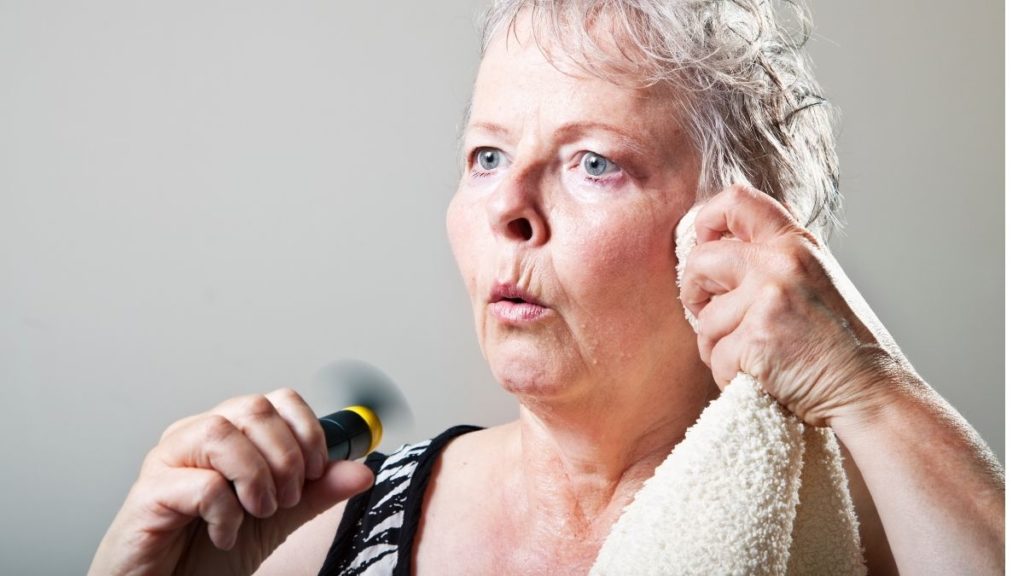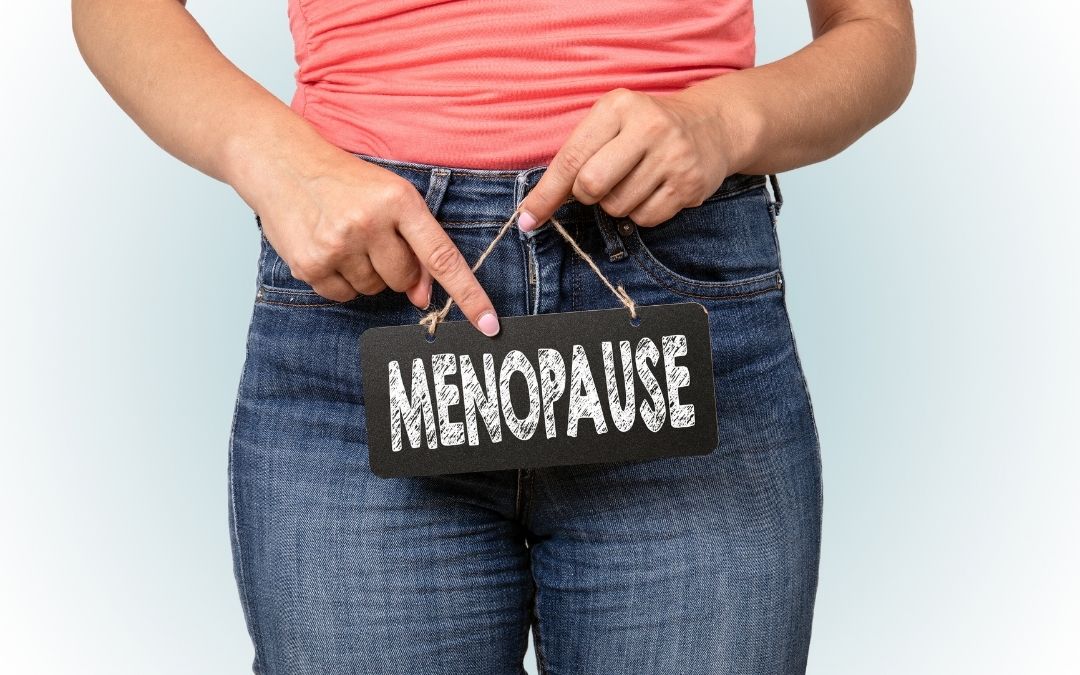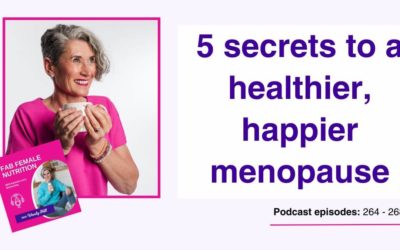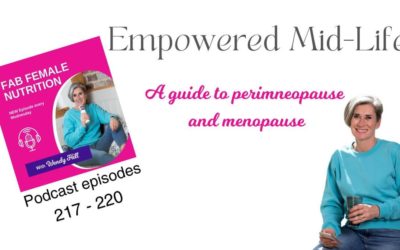The menopause happens to roughly half the population, and yet it is a subject that we are still uncomfortable talking about. Every man will have a woman in their life that is going through, or will go through the menopause, whether it’s their partner, their mother, their sister, their friend or their colleague, there is no escape!
In my experience most men are keen to know more, but unsure how to ask and where to go. So, if you are a woman reading this please forward it to the men in your life, and if you are a guy reading this – I hope this answers your questions.
What is the menopause and perimenopause?
Menopause will occur naturally for every woman who reaches a certain age, the average being 51. however perimenopause can be happening for ten years or more, and it can be brought on early as a result of external factors like a hysterectomy or some cancer treatments.
Menopause is actually just a single day – the day when a woman has not had a period for one year. Once this landmark is reached she transitions from perimenopause into post menopause. However, menopause is the term that we tend to use to describe the whole journey, and will be the word I use here.
Perimenopause is the time period (excuse the pun) that leads to menopause. We will be covering some of the key things you need to know below, and you might also want to read my article.
It’s important to understand that, regardless of when it comes, and how long it lasts, it’s a huge change in a woman’s life. It can be an emotional time on top of the physical and hormonal changes that occur. Many women grieve the loss of their childbearing years, their youth or a part of their lives they associate with their femininity.
Here is a list of the key things you need to know:
Approximately 20% of the female population will be lucky enough to go through the menopause with no symptoms, the rest of us will experience some or all of the 34 symptoms associated with menopause.
Yes guys, 34 symptoms! Here’s a list of just some of them that we can look forward to:
- Anxiety
- Depression
- Weight gain
- Vaginal dryness
- Hot flashes
- Sleep depravation
- Irritability
- Heavy bleeding
- Irregular periods
- Migraines
- Hair loss
- Hirsutism (facial hair)
- Dry skin
1. Our emotions and mood are unpredictable.
The see-saw of hormones lead to a see-saw of emotions that are beyond our control. There is no template, and every woman will go through menopause differently. Imagine how scary it is to embark on a health journey where no-one can tell you what to expect, and you cannot avoid it?
Unexplained anxiety and uncontrolled anger are amongst the most common early symptoms. And they can happen a long time before any changes to our cycle – which means that many women don’t realise they are the early signs of menopause.
Gripped with a sudden lack of confidence and inability to make a decision can be crippling and take everyone by surprise. Just at the time when women may be reaching the peak of their career.
Practical tip: if you feel that your partner or colleague may be suffering with a lack of confidence be patient. Take a bit more time to encourage them and remind them from time to time just how much they really do know. A little support will go a long way.
2. When it comes to sex, menopause might kill the mood.
During perimenopause, our ovaries stop producing oestrogen, and our levels of testosterone also start to drop. Both which can lower our libido.
Oestrogen is also our natural lubricant. Lower levels of this hormone can cause dryness and thinning, particularly in the vagina, known as vaginal atrophy, and it can make sex painful.
Practical tip: This can be a difficult subject to broach: you are worried your partner is not as aroused by you, and she is worried that sex is going to be painful. It doesn’t have to be a barrier, talk to them about what feels good and what doesn’t. Experiment with lubricants, there are some great natural lubricant that ease vaginal dryness and can make sex more enjoyable for you both.
3. Hot flashes make you feel like you’re on fire.

Imagine standing there, minding your own business, and suddenly feeling like your entire body is engulfed in flames. You start to sweat, it’s hard to concentrate, and you might even get rather red faced. That’s what hot flashes are like — and they’re no fun.
At least half of women experience them during menopause. Some women only have them at night, others have them many times a day and night. Often at the most inconvenient of times: that big presentation – check, a serious job interview – check.
They can seriously impact quality of sleep for many women for many years. Sleep deprivation is a form of torture – I’ll leave that one there for you.
Practical tip: When we are in the throes of a hot flush it can be hard to think straight, just be patient and give it time to abate – do not ever poke fun as this can cause us to get embarrassed and make the flush last longer.
4. We are scared we are getting old
From a male perspective, it might seem like a woman would be downright gleeful to get rid of a monthly occurrence that forces her to bleed from her vagina. But for many of us it can feel like the end of our femininity.
The lack of oestrogen can start to show in our skin and hair. We start to get (even more) wrinkles and our hair might start to lose some of its thickness and lustre. Top that with some middle weight gain and aforementioned anxiety and our confidence might just reach rock bottom.
Practical Tip: Please don’t patronise us by telling us we should be glad that we no longer have a period to worry about. Spend that time telling us how attractive you find us, we really need to hear it right now.
5. There will changes that can be hard to handle
Menopause can cause many physical symptoms and it’s the often the external ones that bother us most. Even though we don’t want to admit it, appearance matters. And if our hair starts to thin, our wrinkles get more pronounced and we put on several pounds around the middle, it can really knock our confidence.
Then there are the mental symptoms such as unexplained crying or rage. And the brain fog and forgetfulness can be exasperating for us, so please don’t make it worse with impatience and frustration.
Practical Tip: Are you also going through some middle aged angst too? A bit of weight gain, a receding hairline. Now would be a good time to share your worries and fears with us. It’s good to talk.
6. A healthy lifestyle helps.
Menopause raises a woman’s risk of heart disease, stroke and osteoporosis.

A healthy lifestyle makes everything better, and menopause is no exception. Research shows that people are more successful at making healthy changes if their partners make them too. Offering to cook a healthy meal might seem like a small thing but it could make a big impact physically and emotionally.
Practical Tip: How about signing you both up to a gym? Why not try dancing classes? It’s an opportunity for you to spend time together, and research shows that physically active women have fewer menopause symptoms.
External help and support
There are some over-the-counter herbal remedies and supplements that may help mediate menopausal symptoms. And Hormone Replacement Therapy (HRT) can be prescribed to those that need it via their GP or Menopause Clinician.
I am a Nutritional Therapist and a female hormone specialist. I support women through my 1-1 work to help them successfully navigate the perimenopause and beyond, and I would love to support the women in your life. If you would like to know more about my 1-1 packages please follow the link.
I also have an amazing membership for all ‘Fabulous & Female’s that offers monthly topics around female hormone health, advice on food and nutrition, click here to find out more.
Practical tip: Why not treat your loved one to a years membership of my Fabulous & Female group?
What next?
Once this period of fluctuation and change has ended the future can look very bright. Many women notice an uplift in mood and confidence. Feeling optimistic about the future and the opportunities available to them.
Post menopause is a period of calm.




